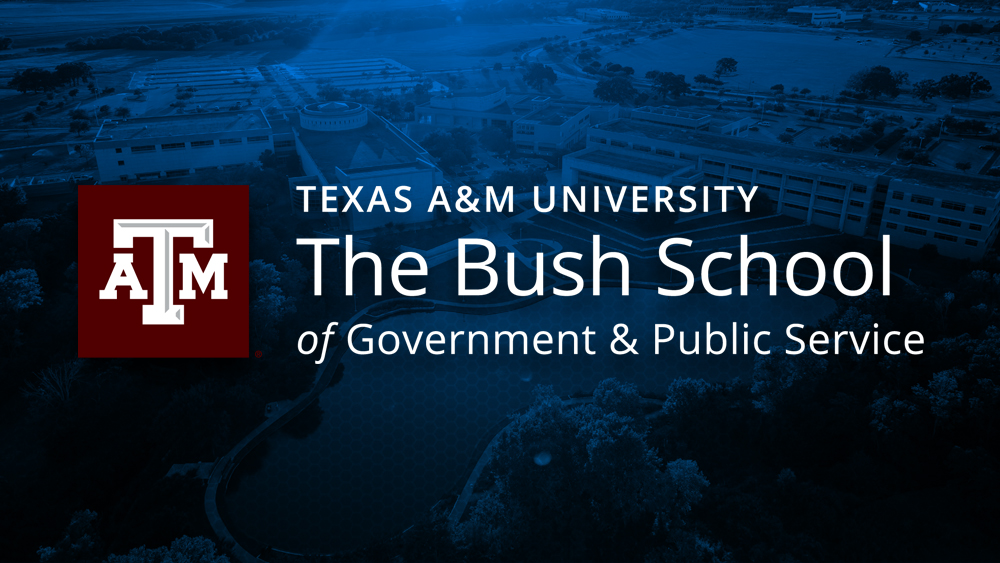The Economic Statecraft Speaker Series connects current students and faculty with experts across policy and academic spheres.
2024 Breakfast Speaker Series
The Economic Statecraft Discussion Series engages current and former executive branch officials, scholars, and congressional staffers in regular dialogue about economic/security challenges and innovative policy solutions. The Spring 2024 series ran five thematically-oriented sessions covering effects-based, actionable frameworks for thinking about and doing economic statecraft. A small group of invitees attend regular monthly discussions to build intellectual capital around economic statecraft.
2023 Speaker Series
China’s Politics and Economics in the 2020s – Convergence or Divergence?
November 2, 2023 | Zoom
Dr. Rana Mitter – Harvard University
12:00pm – 1:00pm Central Time
Dr. Mitter is the ST Lee Chair in US-Asia Relations at the Harvard Kennedy School. He has authored several books, including Forgotten Ally: China’s World War II (2013), which won the 2014 RUSI/Duke of Westminster’s Medal for Military Literature and was named a Book of the Year in the Financial Times and Economist. His latest book is China’s Good War: How World War II Is Shaping a New Nationalism (Harvard, 2020).
His writing on contemporary China has appeared in Foreign Affairs, Harvard Business Review, and The Guardian. He has commented on China in media and for a around the world, including the World Economic Forum at Davos. His recent documentary on contemporary Chinese politics Meanwhile in Beijing is available on BBC Sounds.
Dr. Mitter won the 2020 Medlicott Medal for Service to History, awarded by the UK Historical Association. He previously taught at Oxford and is a fellow of the British Academy

Trafficking Data: How China is Winning the Battle for Digital Sovereignty
October 19, 2023 | Zoom
Dr. Aynne Kokas – University of Virginia
12:00pm – 1:00pm Central Time
On August 6, 2020, the Trump Administration issued a ban on TikTok in the United States,
requiring that the owner—Beijing-based Bytedance—sell the company to American investors or shut it down. American suitors like Walmart and Oracle tried to make a deal with Bytedance to keep the platform operating in the U.S., but the Chinese government refused the sale on national security grounds. Technology firms in the two largest economies in the world—the United States and China—have exploited government policy (and the lack thereof) to gather information on citizens, putting US national security at risk.
Since the fateful 2020 bans, states around the U.S. including Virginia, have issued bans on Chinese apps and other technologies. However, the U.S. has yet to establish nationwide protections for user data, and firms like TikTok continue to operate throughout the U.S. Professor Kokas argues that fragmented U.S. government tech leadership, Silicon Valley’s disruption fetish, and Wall Street’s addiction to growth have fueled China’s technological goldrush. In turn, American complacency yields an unprecedented opportunity for Chinese firms to gather data in the United States and quietly send it back to the Chinese government who capitalize on this data for political gain.
Dr. Kokas is the C.K. Yen Professor at the Miller Center, the director of the UVA East Asia Center, and a professor of media studies at the University of Virginia. Her research examines Sino-U.S. media and technology relations. She is a non-resident scholar at Rice University’s Baker Institute of Public Policy, a life member of the Council on Foreign Relations, and a fellow in the National Committee on United States-China Relations’ Public Intellectuals Program. She has received fellowships from the Library of Congress, National Endowment for the Humanities, Mellon Foundation, Social Science Research Council, Woodrow Wilson Center for International Scholars, Japan’s Abe Fellowship, and other international organizations. Her writing and commentary have appeared globally in more than 50 countries and 15 languages.
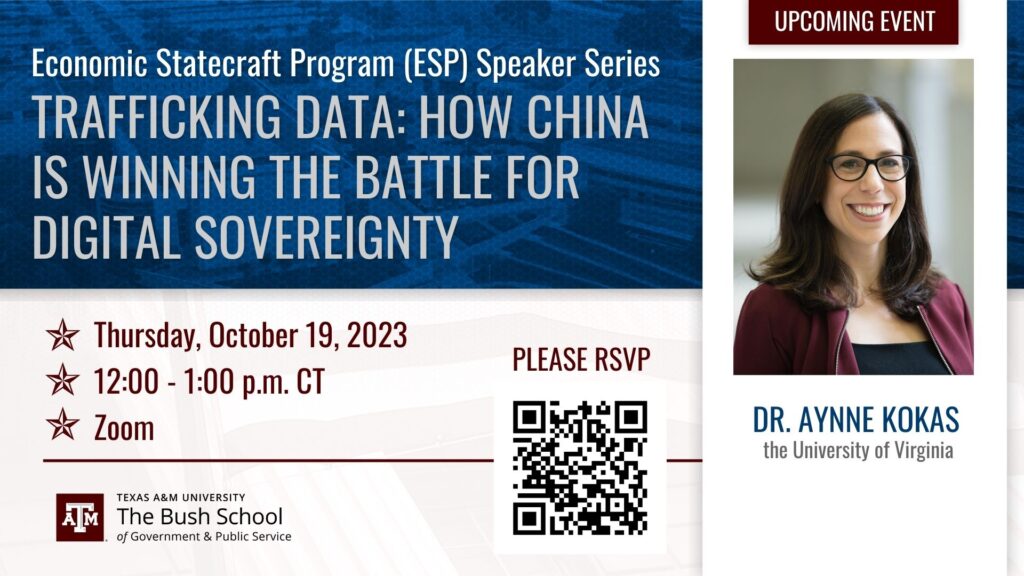
China’s Relational Power in Africa: Beijing’s “New Type of Party-to-Party Relations”
October 5, 2023 | Zoom
Dr. Joshua Eisenman – University of Notre Dame
12:00pm – 1:20pm Central Time
Using a Chinese conceptualization of social capital, informal interviews and two decades of official data, Professor Joshua Eisenman explains how and why the CPC is building relationships with African political elites. The International Department of the Central Committee of the Communist Party of China (ID-CPC) has become the primary party organ tasked with enhancing China’s ‘relational power’ with like minded political partners regardless of their ideology. The ID-CPC continues to expand and deepen its relationships with African political elites, maintained them virtually during COVID-19, and quickly restarted in-person exchanges as soon as China’s pandemic travel restrictions were loosened early this year. The ID-CPC offers its African counterparts bilateral and multilateral ‘host diplomacy’ and ‘cadre training’ programs that share Chinese governance methods and rewards them for their praise and political support.
Dr. Joshua Eisenman is associate professor of politics in the Keough [KEE-oh] School of Global Affairs at the University of Notre Dame. He is also a fellow of the Keough School’s Liu Institute for Asia and Asian Studies, Kellogg Institute for International Studies, and Pulte Institute for Global Development. Prior to this, Dr. Eisenman served as a policy analyst on the US-China Economic and Security Review Commission (2003–05) and a senior fellow for China studies at the American Foreign Policy Council since 2006.
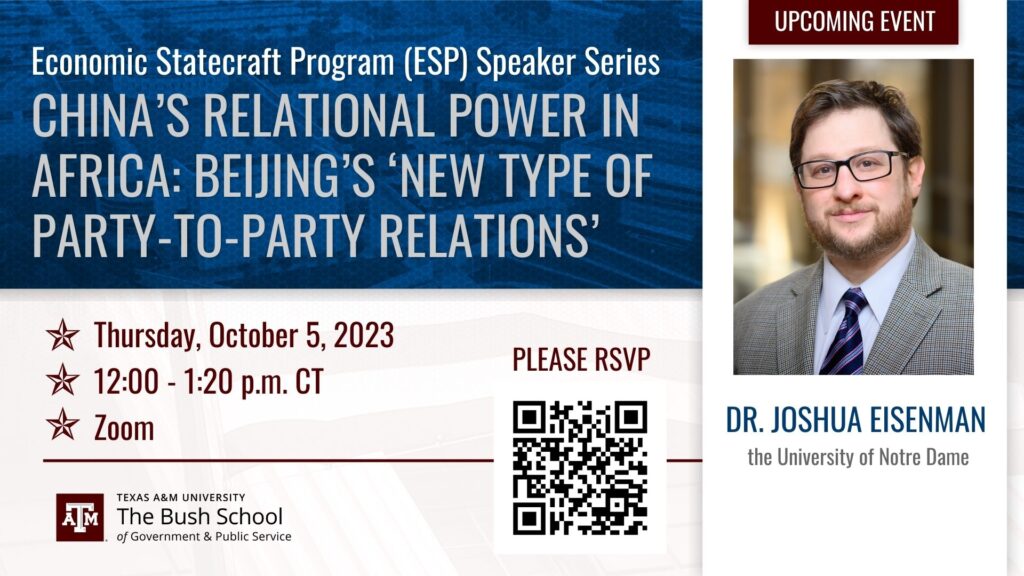
Mad Money? China’s Digital Currency & Questions of Weaponized Interdependence
September 28, 2023 | Zoom
Dr. Marc Lanteigne – University of Tromsø
12:00pm – 1:20pm Central Time
The government of China has long touted the development of a digital version of its currency as a watershed element of its ongoing financial modernisation processes. The experimental digital renminbi (shuzi renminbi 数字人民币) or ‘eCNY’, is expected to be fully implemented in 2022-3, and thus far its initial benefits to the Chinese economy have been noted primarily on the domestic level, including facilitating transactions and offering further financial options to ‘unbanked’ populations. However, Beijing has also hinted at the possibility of the eCNY being used for international transactions, leading to questions as to whether this e-currency could develop into a global standard as many other governments also seek to develop their own central bank digital currencies / CBDCs. Use of digital renminbi may enable Beijing to engage in a financial ‘decoupling’ process from Western organisations and regimes, such as the SWIFT banking protocol, and may assist China and other participating nations to better withstand economic pressures from the United States. With the ongoing development of the Belt and Road, China may also be able to encourage transactions between partners using the eCNY, further strengthening the country’s financial and structural power and representing a significant leap in the process of internationalising the renminbi while weakening the power of the US dollar. Thus, the concept of ‘weaponised interdependence’, meaning the ability of states to gain advantages from global networks via the collection of data and the capacity to deny others access and benefits, is an ideal method of measuring the potential for the digital renminbi to act as another element in widening Sino-American trade competition.
Marc Lanteigne (Ph.D. McGill University) is an Associate Professor of Political Science at the University of Tromsø [TROM zo]: The Arctic University of Norway. Prior to this, Lanteigne was a Senior Lecturer at the Centre for Defence and Security Studies (CDSS) at Massey University in Auckland and Senior Research Associate at the Department of East Asian Studies in Ruhr University Bochum. He is Editor-in-Chief of an Arctic news website Over the Circle, a part-time lecturer at Peking University, an adjunct researcher at the Centre for Arctic Studies at the University of Iceland, Reykjavík, and a member of the board of the UK-based Polar Research and Policy Initiative (PRPI).
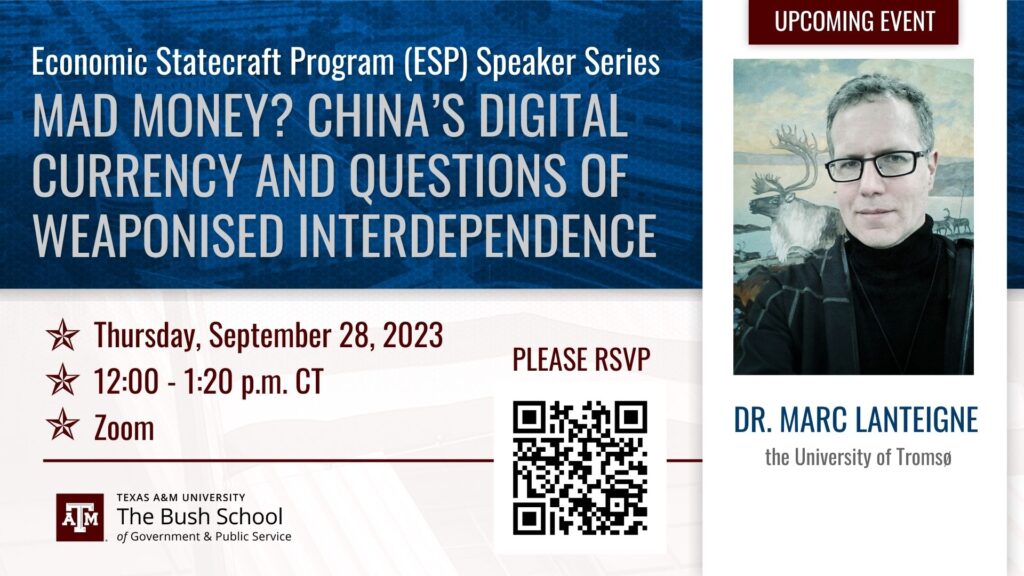
America’s Competitiveness in the Global Economy
September 21, 2023 | Zoom
Craig Allen – President US-China Business Council
12:00pm – 1:00pm Central Time
Since the days of the American Revolution, economic statecraft has been an important component of US foreign policy. Through export promotion, trade negotiations, export financing, development financing, and participation in global standards-setting bodies, the USG has always encouraged American exports and American competitiveness in global markets. From the Truman administration to the Trump administration, export promotion and commercial diplomacy have been aggressively advanced, albeit in different forms. In the Biden administration, however, the pro-globalization and pro-export agenda has been de-emphasized, if not subsumed. In its place, the Biden administration has underscored industrial policy and domestic infrastructure investment.
On July 26, 2018, Craig Allen began his tenure as the sixth President of the United States-China Business Council (USCBC), a private, nonpartisan, nonprofit organization representing over 200 American companies doing business with China.
Prior to joining USCBC, Craig had a long, distinguished career in US public service. His last government position was as US Ambassador to Brunei Darussalam (December 2014–July 2018). Before that, Craig served in Washington as Deputy Assistant Secretary for China (2012–2014) in the Department of Commerce’s International Trade Administration (ITA), and as Deputy Assistant Secretary for Asia (2010–2012).
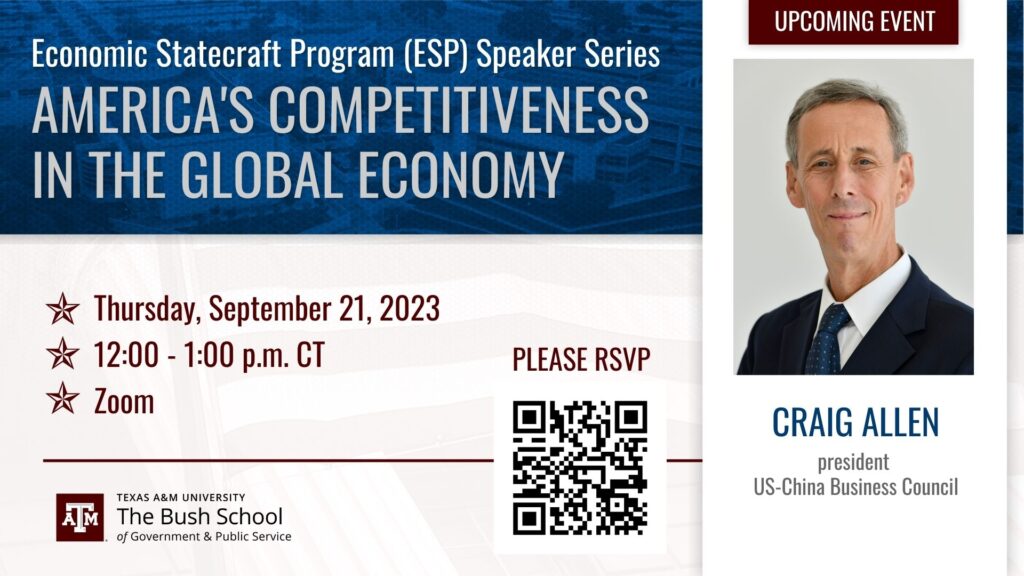
2021 Speaker Series
The Logic and Limits of China’s Outward Investment
April 13, 2021 | Zoom
Dr. Meg Rithmire – F. Warren MacFarlan Associate Professor of Business, Government, and International Economy
This session was hosted with Dr. Meg Rithmire, who is F. Warren MacFarlan Associate Professor in the Business, Government, and International Economy Unit. Professor Rithmire holds a PhD in government from Harvard University, and her primary expertise is in the comparative political economy of development with a focus on China and Asia. Her first book, Land Bargains and Chinese Capitalism (Cambridge University Press, 2015), examines the role of land politics, urban governments, and local property rights regimes in the Chinese economic reforms. A new project, for which Dr. Rithmire conducted fieldwork in Asia in 2016-2017, investigates the relationship between capital and the state and globalization in Asia. The project focuses on a comparison of China, Malaysia, and Indonesia from the early 1980s to the present.
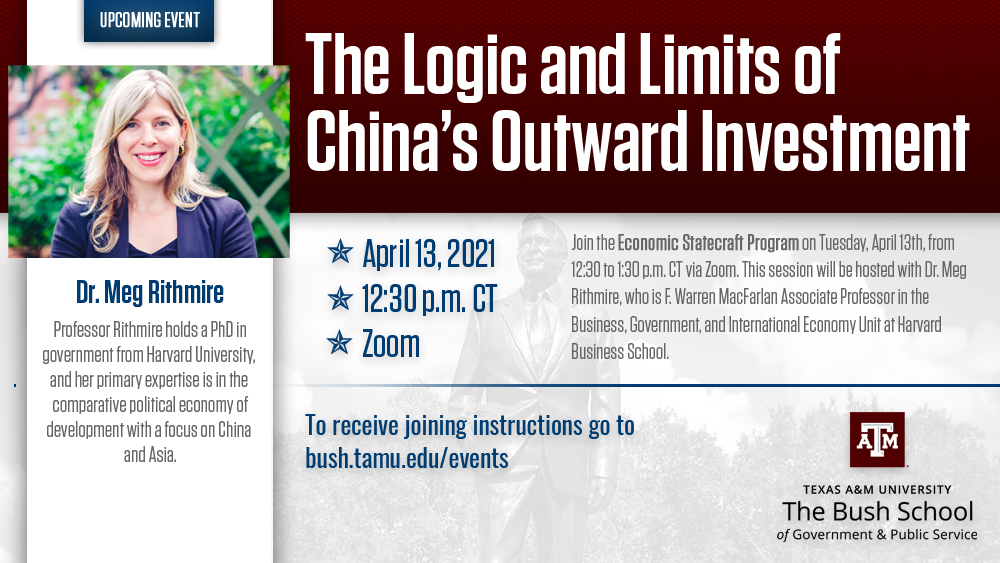
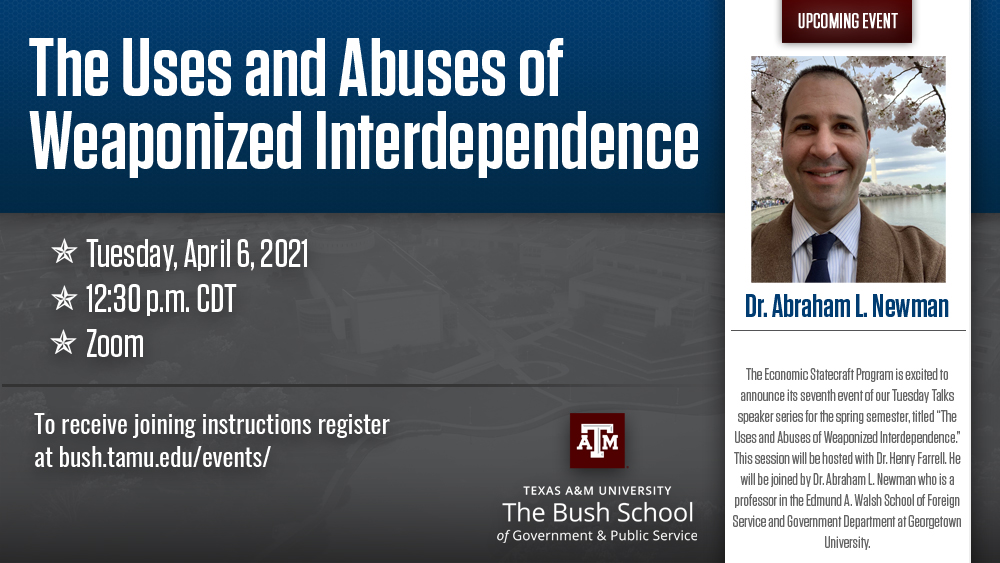
The Uses and Abuses of Weaponized Interdependence
April 6, 2021 | Zoom
Dr. Henry Farrel – George Washington University Professor of Political Science and International Affairs & Dr. Abraham L. Newman – Georgetown University Professor of Foreign Service and Government
This session was hosted with Dr. Henry Farrell, an Associate Professor of political science and international affairs at George Washington University. He works on a variety of topics, including trust, the politics of the Internet, and international and comparative political economy. He was joined by Dr. Abraham L. Newman, who is a Professor in the Edmund A. Walsh School of Foreign Service and the Department of Government at Georgetown University. He is the Director of the Mortara Center for International Studies. His research focuses on the ways in which economic interdependence and globalization have transformed international politics. Dr. Farrell and Dr. Newman discussed their most recent book, The Uses and Abuses of Weaponized Interdependence, which addresses how globalized information networks can be used for strategic advantage. By exploring how China, Russia, and the United States might be expected to weaponize control of information and manipulate the global economy, the authors challenge scholars and practitioners to think differently about foreign economic policy, national security, and statecraft.
The Emperor’s New Road: China and the Project of the Century
March 30, 2021 | Zoom
Jonathan Hillman – Senior Fellow with the CSIS Economics Program and Director of the Reconnecting Asia Project
Jonathan E. Hillman is a senior fellow with the CSIS Economics Program and director of the Reconnecting Asia Project, one of the most extensive open-source databases tracking China’s Belt and Road Initiative (BRI). Hillman has testified before Congress, briefed government officials and Fortune 500 executives, and written on economics, national security, and foreign policy issues for the Financial Times, Wall Street Journal, Washington Post, and other outlets. He discussed his first book is The Emperor’s New Road: China and the Project of the Century.
Prior to joining CSIS, Hillman served as a policy adviser at the Office of the U.S. Trade Representative, where he contributed to the 2015 U.S. National Security Strategy and the President’s Trade Agenda and directed the research and writing process for essays, speeches, and other materials explaining U.S. trade and investment policy. He has also worked as a researcher at the Belfer Center for Science and International Affairs, the Council on Foreign Relations, and in Kyrgyzstan as a Fulbright scholar. He is a graduate of the Harvard Kennedy School, where he was a presidential scholar, and Brown University, where he was elected to Phi Beta Kappa and received the Garrison Prize for best thesis in international relations
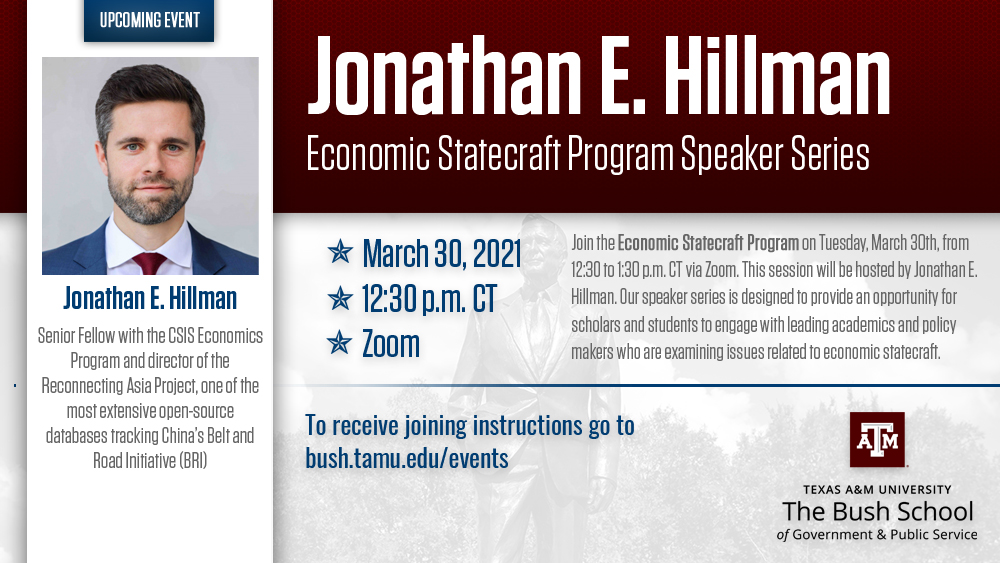
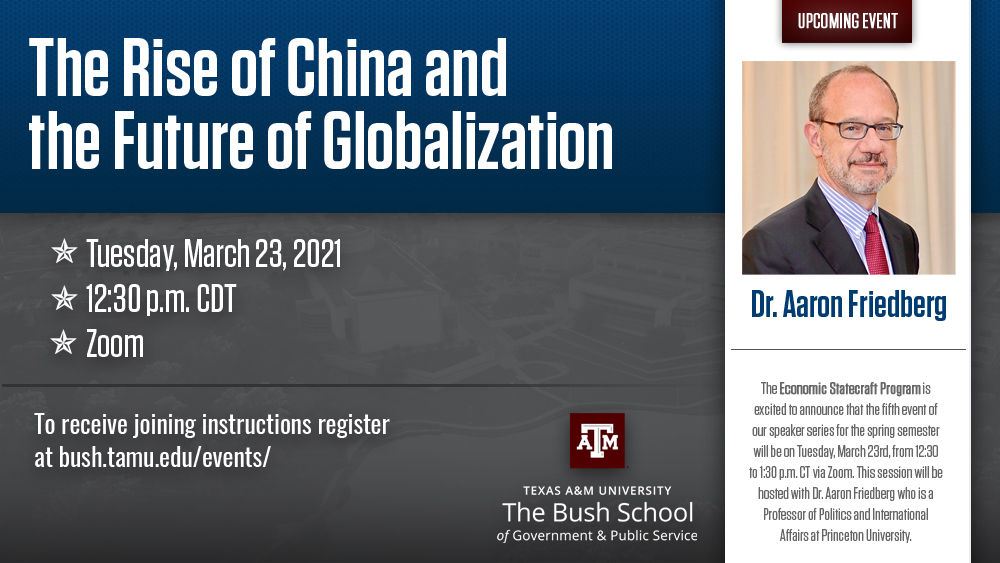
The Rise of China and the Future of Globalization
March 23, 2021 | Zoom
Dr. Aaron Friedberg – Princeton University Professor of Politics and International Affairs
This session was hosted by Aaron L. Friedberg, who is a Professor of Politics and International Affairs at Princeton University, where he has taught since 1987. He is also the Codirector of the Princeton School of Public and International Affairs’s Center for International Security Studies, a non-resident Senior Fellow at the German Marshall Fund of the United States, and a Senior Advisor to the National Bureau of Asian Research. Dr. Friedberg discussed the hegemonic stability theory in relation to China and the prospects of deglobalization.
Economic Statecraft Begins at Home
March 16, 2021 | Zoom
Dr. Jonathan Kirshner – Professor of Political Science and International Studies at Boston College
This session was hosted by Dr. Jonathan Kirshner, who is a Professor of Political Science and International Studies. He discussed the economic consequences of the domestic social economy as a result of the sustained and cumulative inequality in the United States. His research and teaching interests focus on international relations, political economy (especially macroeconomics and money), and politics and film. His current research includes projects on classical realism, the international political implications of the financial crisis and its aftermath, and the politics of mid-century cinema.
Dr. Kirshner was the first World Politics Visiting Fellow at Princeton University’s Institute for International and Regional Studies and was the Director of the Economics and National Security Program at the Olin Institute at Harvard University from 2000 to 2004. With Eric Helleiner, he is the coeditor of the multi-disciplinary book series Cornell Studies in Money as well as the books The Great Wall of Money: Power and Politics in China’s International Monetary Relations and The Future of the Dollar.
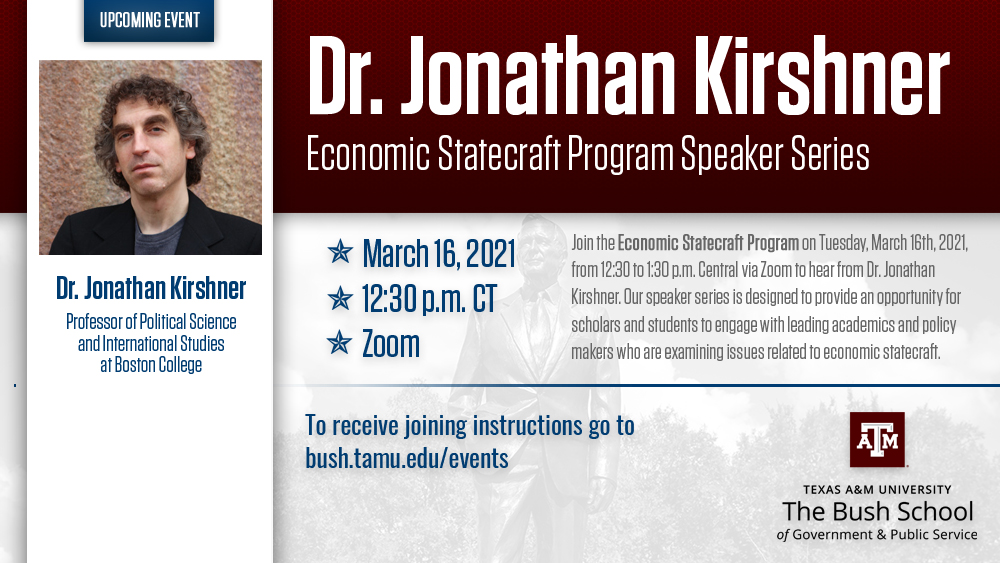
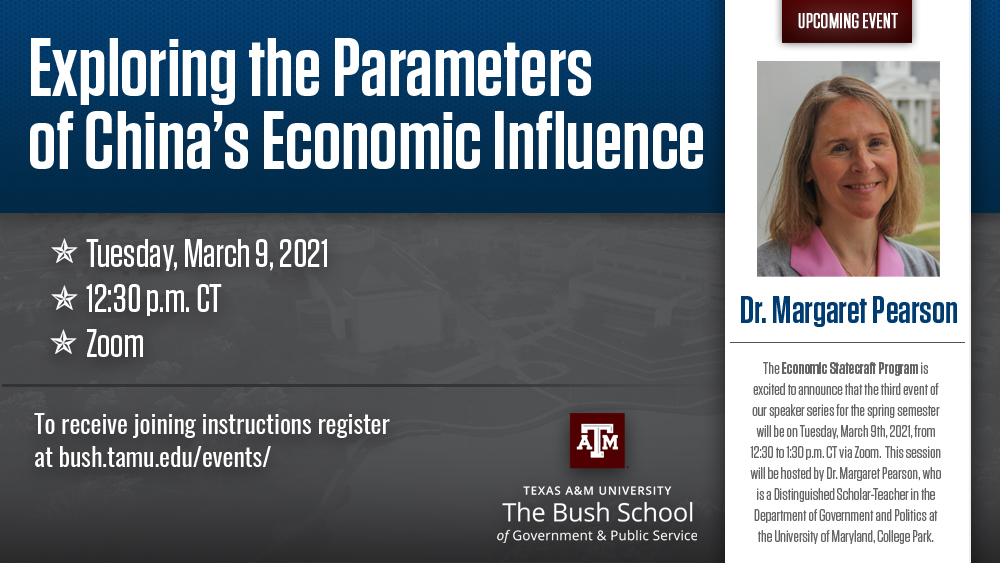
Exploring the Parameters of China’s Economic Influence
March 9, 2021 | Zoom
Dr. Margaret Pearson – Distinguished Scholar of Government and Politics at University of Maryland
This session was hosted with Dr. Margaret Pearson, who is a Distinguished Scholar-Teacher in the Department of Government and Politics at the University of Maryland, College Park. She discussed her recent paper “Exploring the Parameters of China’s Economic Influence.”
Dr. Pearson’s research has focused on China’s domestic political economy, domestic bureaucratic and regulatory behavior, and Chinese foreign economic policy. Her research on China’s domestic politics focuses on state control of the economy and central-local bureaucratic relations, and environmental policy. On Chinese foreign policy, Dr. Pearson’s ongoing projects include determinants of Beijing’s behavior in global institutions, climate change governance, and conceptualizations of China’s overseas influence.
Global Monetary (Dis)Order and the Future of the Liberal International Order
March 2, 2021 | Zoom
Dr. Benjamin Cohen – Louis G. Lancaster Professor of International Political Economy
This session was hosted with Dr. Benjamin Cohen, who is a Distinguished Professor of International Political Economy at the University of California, Santa Barbara. He discussed his recent book Currency Statecraft: Monetary Rivalry and Geopolitical Ambition.
Dr. Cohen argues that the primary motivation for currency statecraft is a state’s geopolitical ambition, noting that internationalized currencies greatly increase the power of the nation that produces it. Today, the major example of monetary rivalry is the emerging confrontation between the U.S. dollar and the Chinese renminbi. Dr. Cohen describes how China has vigorously promoted the international standing of its currency in recent years, even at the risk of exacerbating relations with the United States, and explains how the outcome could play a major role in shaping the broader geopolitical engagement between the two superpowers.
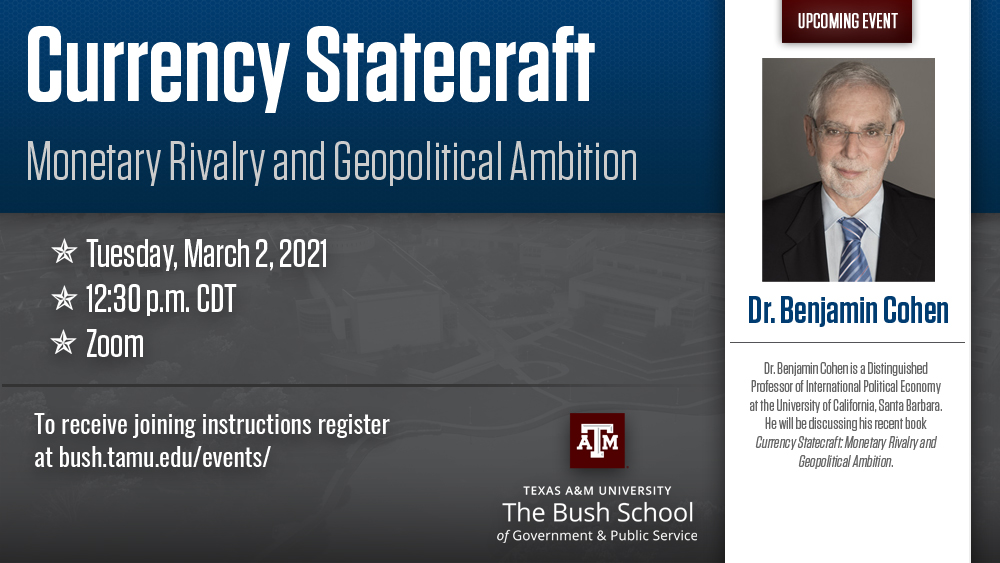
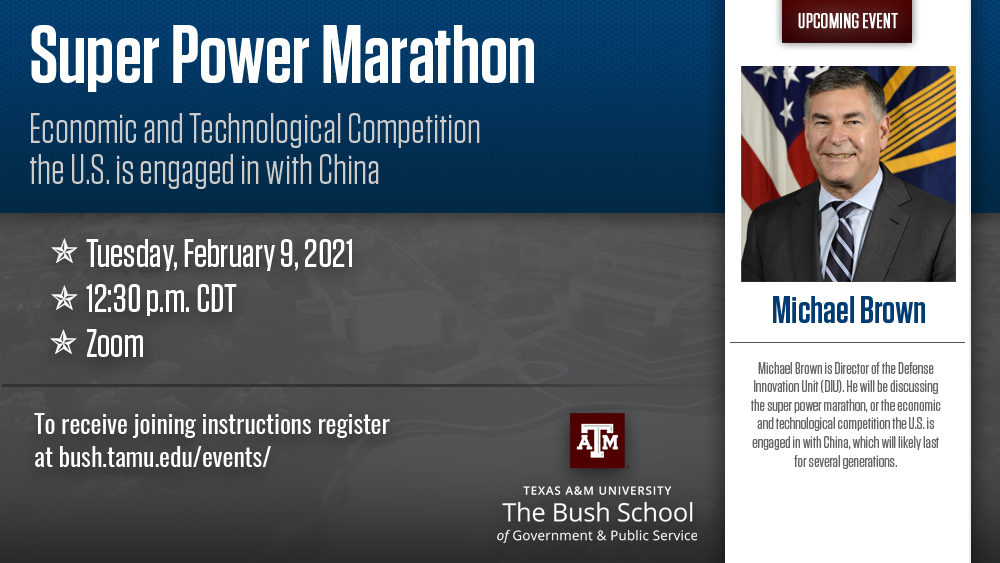
Preparing the United States for the Superpower Marathon with China
February 9, 2021 | Zoom
Michael Brown – Director of the Defense Innovation Unit
This session was hosted with the current Director of the Defense Innovation Unit (DIU), Michael Brown. He discussed the Super Power Marathon, or the economic and technological competition the U.S. is engaged in with China.
Drawing on insights from his time in the U.S. government and his previous experiences as CEO of two leading technology companies (Symantec and Quantum), Mr. Brown discussed the new domains of competition with the People’s Republic of China—economics and technology—where the contest is likely to last multiple generations. While this competition has many dimensions—political, military, diplomatic, and ideological—the crux of the competition is geoeconomic. The key to the economic competition is technology and innovation, which has significant implications for future military advantage as well as commercial prosperity. Read Mr. Brown’s report “Preparing the United States for the Superpower Marathon with China.”
National Security Council policy making process and the nexus of economics and security
December 15, 2020 | Zoom
Lt. Col. (Ret.) Jason Galui – SMU Cox Professor of Practice in Executive Education
This session was hosted with former Council of Economic Advisors and National Security Council staff member Lt. Col. Jason Galui, USA (Ret.). He discussed the National Security Council policymaking process and the nexus of economics and security.
Mr. Galui recently became a Professor of Practice in Executive Education at SMU Cox. During his twenty years in the U.S. Army, Mr. Galui’s service included personally advising President Barack Obama and President Donald J. Trump in the Oval Office, along with their respective National Security Advisors. Mr. Galui also served as Senior Advisor for National Security to the (Acting) Chairman of the Council of Economic Advisors (CEA), and he led CEA’s team responsible for analyzing issues at the nexus of economics and national security. Commissioned as an Armor officer, Mr. Galui led soldiers in combat during the 2003 U.S. invasion of Iraq and held leadership positions from the platoon level to the White House. In 2011 and 2012, he deployed to Kabul, Afghanistan, and served as Strategic Advisor to the Commanding General of the NATO Training Mission-Afghanistan. A two-time Assistant Professor of Economics in the Department of Social Sciences at the United States Military Academy, Mr. Galui taught and mentored two generations of West Point cadets. Mr. Galui earned an MS in economics from the University of Texas at Austin and a BS in economics from the United States Military Academy at West Point.
